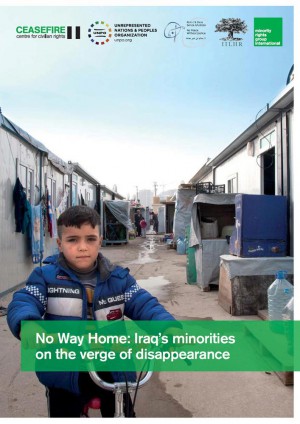
Displaced boy in Ashti IDP camp in Erbil providing shelter to 1,200 mainly Christian families from Ninewa. © Jeff Gardner
© 2016 IILHR, MRG, NPWJ, UNPO – July 2016
This report has been produced as part of the Ceasefire project, a multi-year programme supported by the European Union to implement a system of civilian-led monitoring of human rights abuses in Iraq, focusing in particular on the rights of vulnerable civilians including vulnerable women, internally-displaced persons (IDPs), stateless persons, and ethnic or religious minorities, and to assess the feasibility of extending civilian led monitoring to other country situations.
Key findings
Since June 2014, many thousands of persons belonging to Iraq’s ethnic and religious minorities have been murdered, maimed or abducted, including unknown numbers
of women and girls forced into marriage or sexual enslavement. Islamic State of Iraq and al Sham (ISIS) forces and commanders have committed war crimes, crimes against humanity and the crime of genocide, including summary executions, killing, mutilation, rape, sexual violence, torture, cruel treatment, the use and recruitment of children, and outrages on personal dignity. ISIS has used chemical weapons on these groups. Cultural and religious heritage dating back centuries continues to be destroyed, while property and possessions have been systematically looted. Other forces, including Iraqi Security Forces, Popular Mobilization Units and Kurdish Peshmerga, have also committed war crimes prohibited under applicable international law.
After almost two years, conditions in the internally displaced persons (IDP) camps remain desperate, and underresourced. There are more than 3.3 million displaced
persons, including minorities. Corruption is endemic. Many IDPs are now losing patience with return policies and restrictions, which are starting to generate further demographic changes in Iraq; as many as one in five IDPs feel that they have no choice but to flee the country. The anticipated displacement from a possible effort to retake Mosul
could total as many as 1 million over the next year and the international community could witness the flight of hundreds of thousands of further refugees in 2016 alone.
Many minority communities in Iraq are now on the verge of disappearance. The Christian population, which before 2003 numbered as many as 1.4 million, had dwindled to
350,000 by early 2014, and since the ISIS advance is now estimated as under 250,000. Most of the Yezidi and Kaka’i populations have been forced from their traditional lands
in Ninewa and are now subsisting as IDPs or have fled the country altogether. Similarly, Ninewa’s Shi’a Turkmen and Shabak have fled en masse to Shi’a majority areas in
the south of Iraq. Justice and reconciliation matters remain an unfortunately low priority for the governments in Baghdad and Erbil and, despite supportive rhetoric, for
the international community.
At the time of writing there appears to be no serious Iraqi or international effort to build the political, social and economic conditions for the sustainable return of those who
lost homes and livelihoods as a result of the conflict. Militias and unscrupulous local authorities are exploiting this vacuum. Thoughtful and realistic planning – with identification of financial and other resources – should begin immediately
for the post-ISIS era, including gaining agreement on the establishment of security to allow for the return of affected minorities to their original homes and lands.
This a summary of the key findings. The complete article can be found at: <http://minorityrights.org/wp-content/uploads/2016/06/MRG_CFRep_Iraq_Jun16_4.pdf>
